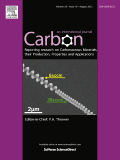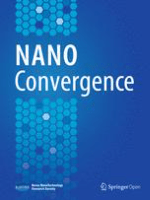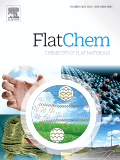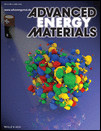
Carbon Trends
Scope & Guideline
Exploring Innovations in Carbon Materials
Introduction
Aims and Scopes
- Synthesis and Characterization of Carbon Materials:
This area emphasizes the development of novel methods for synthesizing carbon materials such as graphene, carbon nanotubes, and activated carbons, along with detailed characterization techniques to understand their structural and functional properties. - Energy Storage and Conversion:
Research within this scope includes the exploration of carbon materials in energy storage systems like supercapacitors and batteries, as well as their roles in energy conversion processes, such as catalysis for fuel cells and photocatalysis for CO2 reduction. - Environmental Applications:
This theme covers the utilization of carbon materials for environmental remediation, including the adsorption of pollutants, water treatment, and the development of eco-friendly materials from waste biomass. - Advanced Composite Materials:
The journal highlights studies on carbon-based composites, focusing on their mechanical, thermal, and electrical properties, and their potential applications in various industrial sectors. - Nanotechnology and Nanomaterials:
This area investigates the properties and applications of carbon nanomaterials, including their use in sensors, drug delivery systems, and as components in nanodevices. - Theoretical and Computational Studies:
Research involving computational modeling and simulation to predict the behavior of carbon materials under various conditions, enhancing the understanding of their properties and guiding experimental efforts.
Trending and Emerging
- Sustainable and Green Chemistry:
There is a growing focus on sustainable practices in carbon material synthesis, including the valorization of waste biomass and green synthesis methods, reflecting a broader trend towards environmental responsibility in research. - Advanced Energy Storage Solutions:
With the increasing demand for efficient energy storage technologies, research on carbon materials for next-generation batteries, supercapacitors, and hybrid systems is on the rise, focusing on enhancing performance and sustainability. - Carbon-Based Nanocomposites:
The integration of carbon materials with other nanomaterials to form composites is trending, particularly in applications for electronics, sensors, and energy devices, showcasing the versatility and multifunctionality of carbon. - Machine Learning and Data Science Applications:
The application of machine learning techniques to predict material behaviors and optimize synthesis processes is emerging as a significant trend, enabling more efficient research and development in carbon materials. - Electrocatalysis and CO2 Reduction Technologies:
Research on carbon materials as electrocatalysts for CO2 reduction and other energy conversion reactions is increasingly prominent, reflecting the urgency of addressing climate change through innovative carbon technologies.
Declining or Waning
- Traditional Carbon Materials:
There is a noticeable shift away from studies focusing solely on conventional carbon materials like carbon black and standard activated carbon, as researchers increasingly explore more advanced and functionalized carbon nanomaterials. - Basic Characterization Techniques:
While fundamental characterization remains important, there is a decreasing emphasis on basic methods, with a preference for more sophisticated techniques that provide deeper insights into the properties of carbon materials. - Single-Use Applications:
Research focusing on single-use or low-performance applications of carbon materials is declining, as the emphasis shifts towards multifunctional and sustainable applications that leverage the advanced properties of carbon nanomaterials.
Similar Journals

Nano Express
Empowering innovation through open-access research.Nano Express is an esteemed open-access journal published by IOP Publishing Ltd, dedicated to advancing research in the fields of nanotechnology and materials science. Since its launch in 2020, the journal has swiftly established itself as a vital resource for researchers and professionals, garnering significant recognition in various domains, including biomaterials, electronic, optical and magnetic materials, and polymers and plastics. With a commendable categorization in Scopus quartiles, it ranks in Q2 for Electronic, Optical and Magnetic Materials, and maintains a top percentile in several others, exemplifying its commitment to high-quality research dissemination. Located in the United Kingdom, this journal fosters a global dialogue among experts and newcomers alike, facilitating open access to innovative research that drives the future of nanotechnology. By offering a platform for groundbreaking studies and reviews, Nano Express aims to bridge the gap between theoretical understanding and practical application, championing the development of next-generation materials that have the potential to transform various industries.

C-Journal of Carbon Research
Unveiling the Future of Carbon Science and SustainabilityC-Journal of Carbon Research is an innovative and dynamic journal published by MDPI, situated in the picturesque city of Basel, Switzerland. Launched in 2015 and operating under an Open Access model, the journal aims to promote the dissemination of high-quality research related to carbon science, environmental sustainability, and renewable resources. With a current impact factor reflecting its growing influence in the field, the journal's standing is bolstered by its Scopus ranking, placing it in the 37th percentile in the Environmental Science category. It offers a platform for researchers, professionals, and students alike to engage with cutting-edge studies, reviews, and discussions that contribute to environmental science advancements. As the journal continues its convergence journey from 2022 to 2024, it remains committed to fostering scholarly exchange and interdisciplinary collaboration on pressing carbon-related challenges.

NEW CARBON MATERIALS
Exploring the Future of Carbon InnovationNEW CARBON MATERIALS, published by Elsevier, is a leading academic journal that focuses on the innovative and multidisciplinary field of carbon materials research. With an ISSN of 2097-1605 and an E-ISSN of 1872-5805, this journal has established itself as a prominent platform for disseminating cutting-edge studies and applications in the realm of carbon nanomaterials, composites, and their industrial applications. Recognized for its high quality, NEW CARBON MATERIALS holds a Q1 ranking in the Materials Science category, reflecting its significant impact within the scientific community. The journal has continuously fostered knowledge exchange since its inception in 2004 and is set to further advance research until 2024. With a Scopus rank of #89 out of 463 journals in the General Materials Science category, this publication is essential for researchers, professionals, and students seeking to stay informed about the latest developments in carbon materials. While it is not an open-access journal, it offers various access options to ensure that the latest findings are available to a broad audience. By bridging the gap between theory and practical application, NEW CARBON MATERIALS is at the forefront of addressing critical challenges and paving the way for future advancements in materials science.

CARBON
Exploring Innovations in Chemistry and Materials ScienceCARBON is a leading peer-reviewed journal published by PERGAMON-ELSEVIER SCIENCE LTD, focusing on the realms of Chemistry and Materials Science. With an impressive impact factor, CARBON is ranked within the top quartile (Q1) of both fields in the 2023 Scimago Journal Rank, remarkably securing the 18th position out of 463 in General Materials Science and the 22nd position out of 408 in General Chemistry. Since its inception in 1963, the journal has been dedicated to publishing high-quality research that advances the understanding of carbon-based materials and their applications. Operating from the United Kingdom, CARBON provides an essential platform for researchers, professionals, and students alike to disseminate their findings and innovations. Although not an open-access journal, it offers access options that maintain the integrity and high standards of academic publishing. As a critical resource in its field, CARBON continues to foster scientific dialogue and development, significantly impacting current and future research.

Nano Convergence
Catalyzing advancements in nanotechnology and engineering excellence.Nano Convergence is a premier open access journal dedicated to the rapidly evolving fields of nanotechnology, materials science, and engineering. Published by SPRINGER, this journal has been at the forefront of interdisciplinary research since its inception in 2014, and is set to continue its journey until 2024. With an impressive impact factor and recognition as Q1 in both Engineering (miscellaneous) and Materials Science (miscellaneous) categories, Nano Convergence ranks among the top publications, listed as Rank #8 out of 307 in General Engineering and Rank #34 out of 463 in General Materials Science according to Scopus metrics. This journal provides a platform for researchers, professionals, and students to share pioneering studies that converge different disciplines within nanotechnology. With its commitment to open access, Nano Convergence ensures that cutting-edge research is readily available to the global community, fostering innovation and collaborative advancements in the field.

Carbon Energy
Transforming energy research into impactful solutions.Welcome to Carbon Energy, an esteemed open-access journal published by WILEY that focuses on cutting-edge research in the field of energy and materials science. Since its inception in 2019, this journal has quickly established itself as a leading platform for disseminating impactful findings and innovations related to carbon-based energy solutions, renewable resources, and sustainability practices. With its impressive Q1 rankings in multiple categories—including Energy (miscellaneous), Materials Chemistry, and Renewable Energy—Carbon Energy is recognized for delivering high-quality, peer-reviewed content that meets the rigorous standards of the academic community. Through its open-access model, the journal ensures wide accessibility of research findings, making it an invaluable resource for researchers, professionals, and students alike. As we look toward the future, Carbon Energy aims to further its mission of advancing sustainable energy technologies and promoting interdisciplinary collaboration in tackling global energy challenges.

International Journal of Electrochemical Science
Innovating electrochemistry for a sustainable future.International Journal of Electrochemical Science is a peer-reviewed journal dedicated to disseminating cutting-edge research in the field of electrochemistry. Published by Elsevier in Serbia, this journal serves as a vital platform for scientists and researchers to explore innovative electrochemical techniques, processes, and applications. With an ISSN of 1452-3981, it has been a respected source of scholarly articles since its inception in 2006 and continues to bridge the gap between theoretical advancements and practical implementations up until 2024. Notably, it holds a Q4 quartile ranking in the field of electrochemistry and ranks 41 out of 60 in the Scopus database, situating it within the 32nd percentile among its peers. The journal champions open academic discourse, contributing significantly to the advancement of knowledge in electrochemical sciences, making it an essential resource for researchers, professionals, and students alike who are striving towards new discoveries and innovations.

Polymer-Plastics Technology and Materials
Championing Open Access in Material AdvancementsPolymer-Plastics Technology and Materials is a premier academic journal published by Taylor & Francis Inc., dedicated to the dynamic fields of chemical engineering, materials chemistry, and polymers and plastics. With an impact factor that reinforces its reputation, this journal is strategically indexed in Scopus, ranked notably within its categories (Q2), showcasing its influence and relevance in the academic community. Since its inception in 2019, the journal has served as an essential platform for researchers, professionals, and students to disseminate innovative studies and advancements in polymer science and materials technology. As an Open Access publication, it ensures that cutting-edge research is accessible to a global audience, fostering collaboration and knowledge sharing in the material sciences. Located in the United Kingdom, Polymer-Plastics Technology and Materials continues to enhance the dialogue within the industry, addressing critical challenges and exploring emerging trends that shape the future of polymer and plastics technologies.

FlatChem
Elevating Knowledge Exchange in Surfaces, Coatings, and FilmsFlatChem, an esteemed journal published by ELSEVIER, serves as a premier platform for disseminating high-quality research in the dynamic fields of ceramic and composite materials, electronic and optical materials, materials chemistry, and surfaces, coatings, and films. Since its inception in 2017, the journal has garnered a robust reputation, evidenced by its rank in the top quartile (Q1) across multiple categories, including a commendable rank of #25/127 in Ceramics and Composites and #49/284 in Electronic, Optical and Magnetic Materials. With a focus on pioneering advancements and innovative methodologies, FlatChem not only highlights cutting-edge research but also promotes collaboration and knowledge exchange within the scientific community. The journal’s impact is underscored by its impressive rankings in Scopus, marking it as a vital resource for researchers, professionals, and students aiming to stay at the forefront of materials science. As an open-access journal, it ensures that groundbreaking findings are readily accessible, fostering a broader understanding and application of materials innovation worldwide. The journal is based in the Netherlands, with its headquarters located at RADARWEG 29, 1043 NX AMSTERDAM, NETHERLANDS. Join the vibrant community contributing to FlatChem and engage with the forefront of material advancements.

Advanced Energy Materials
Leading the Charge in Renewable Energy TechnologiesAdvanced Energy Materials is a leading academic journal published by WILEY-V C H VERLAG GMBH, focusing on the rapidly evolving fields of materials science and renewable energy technologies. With an impressive impact factor and recognition as a top-tier journal, it ranks within the Q1 category in both Materials Science (miscellaneous) and Renewable Energy, Sustainability and the Environment as of 2023. Spanning from 2011 to 2024, the journal serves as an essential platform for researchers, professionals, and students eager to explore groundbreaking advancements in energy materials, fostering innovative solutions to global sustainability challenges. The journal's authoritative content is supported by rigorous peer review, ensuring high-quality research contributes to the academic community and beyond. Located in Weinheim, Germany, Advanced Energy Materials stands at the forefront of scientific inquiry, making it an invaluable resource for those invested in the future of energy and materials science.